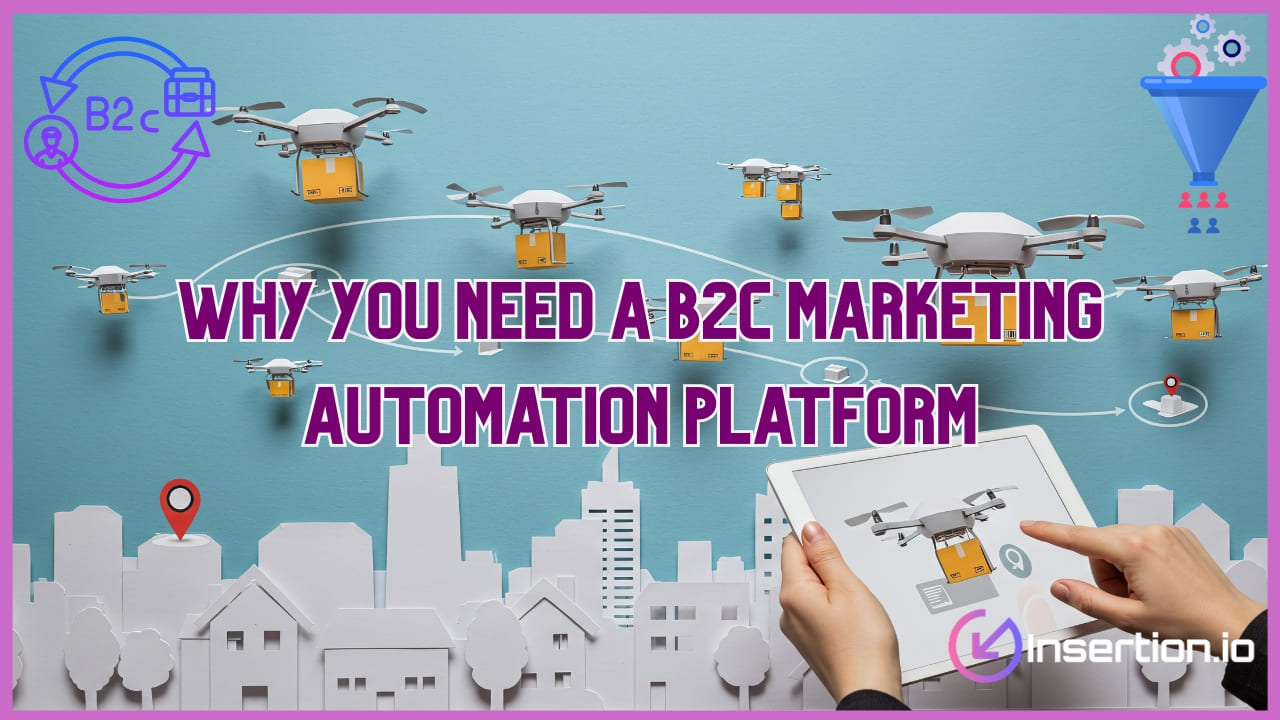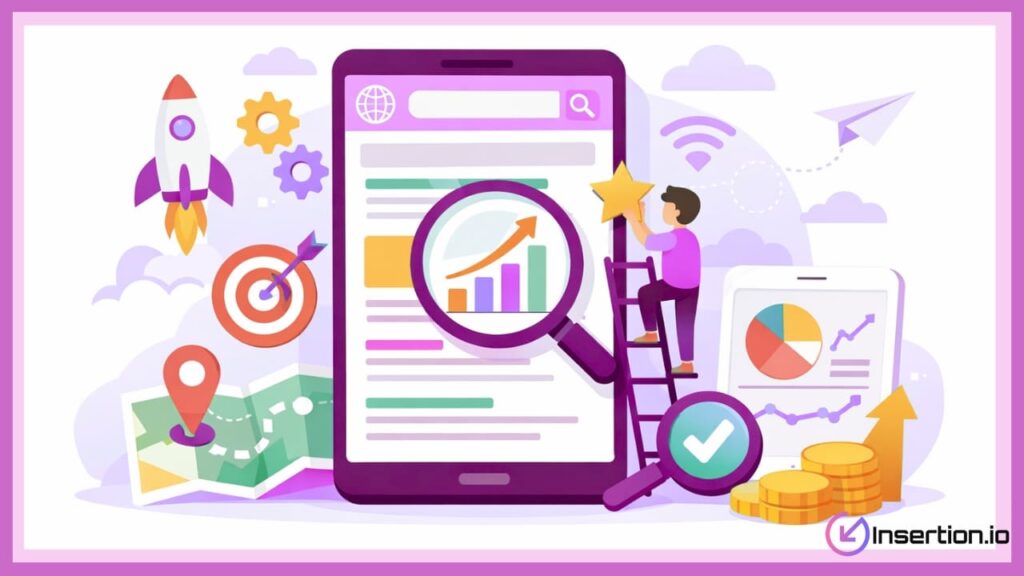
In the competitive landscape of B2C marketing, businesses face the challenge of delivering personalized experiences on a large scale. 78% of consumers are more likely to make repeat purchases from brands that personalize their experiences. However, manual marketing efforts often fall short in meeting these expectations. Implementing a B2C marketing automation platform enables businesses to automate tasks like email marketing, SMS campaigns, and customer segmentation, ensuring timely and relevant communication.
This article delves into the significance of B2C marketing automation, its benefits, and how to effectively leverage it to enhance customer engagement and drive growth.
What is B2C marketing automation?
B2C marketing automation refers to the use of technology to automate marketing tasks and campaigns targeted at individual consumers. It streamlines processes like email marketing, customer segmentation, and customer engagement to deliver personalized experiences at scale. By leveraging marketing automation tools and platforms, B2C businesses can create automated workflows that enhance customer experience, improve communication, and boost sales. With automation capabilities such as personalized email campaigns, SMS marketing, and omnichannel marketing, B2C companies can efficiently manage customer data and deliver tailored content at the right time, ensuring increased customer engagement and improved marketing performance.
What is the difference between B2B and B2C marketing automation?
| Aspect | B2B Marketing Automation | B2C Marketing Automation |
|---|---|---|
| Target Audience | Focuses on business customers and organizations. | Targets individual consumers. |
| Customer Journey | Longer sales cycles, multiple decision-makers. | Shorter sales cycles often lead to impulsive decisions. |
| Personalization | Personalized content tailored for businesses. | Personalized content focused on individual preferences. |
| Automation Features | Focuses on lead nurturing and account management. | Focuses on customer engagement and retention. |
| Marketing Channels | Primarily email and content marketing. | Omnichannel marketing, including SMS and social media. |
| Sales & Marketing Alignment | More closely aligned, as marketing targets leads. | Often disconnected, as marketing targets mass audiences. |
| Campaign Focus | Nurturing leads and educating on product value. | Engaging customers with discounts, offers, and new products. |
| Marketing Tools | CRM, email marketing, and sales automation tools. | Email marketing, social media, and SMS marketing tools. |
| Customer Data | Deep analytics and segmentation. | Lighter segmentation, based on demographics and behaviors. |
| Examples | Salesforce, HubSpot, Marketo. | Klaviyo, Mailchimp, Omnisend. |
Why is B2C marketing automation so valuable?
It makes your business more discoverable:
B2C marketing automation helps businesses enhance their online visibility by delivering targeted content to customers. With automated email marketing campaigns, personalized emails, and SMS marketing, companies can reach the right audience at the right time. Additionally, using marketing automation platforms enables businesses to track customer data, behavior, and preferences, ensuring that the marketing efforts are optimized. This approach boosts customer engagement and improves the overall customer experience, making the brand more discoverable across multiple channels, such as email, social media, and websites.
It lets you do more by working less:
Marketing automation tools save time and effort by automating repetitive tasks, such as sending welcome emails, managing campaigns, and segmenting customers. By using the right B2C marketing automation software, businesses can streamline marketing tasks like email campaigns, content marketing, and customer engagement. Marketing teams can focus on higher-value tasks such as strategizing and analyzing campaign performance. Moreover, automation features such as workflow automation and email marketing automation ensure that businesses can run continuous marketing campaigns without manual intervention, thereby increasing efficiency and reducing the workload.
It lets you experiment for optimum results:
B2C marketing automation platforms allow businesses to experiment with various marketing strategies by running A/B tests and tracking campaign performance. For example, companies can test different email subject lines, call-to-actions, or personalized email templates to determine which resonates best with their audience. Additionally, marketing automation provides real-time data on customer responses, helping businesses refine their campaigns accordingly. This ability to test and adjust marketing tactics for optimal results enables companies to continually optimize their marketing strategies and ensure they deliver the most effective customer experience.
It makes you more human:
Although B2C marketing automation relies on technology, it enables businesses to deliver a more personalized and human-like experience to their customers. By automating customer engagement, such as sending personalized emails and offering tailored content, businesses can create a more intimate relationship with their audience. Automation tools like Klaviyo help businesses send relevant messages at the right moments in the customer journey, building trust and fostering customer loyalty. This personalized approach makes customers feel valued, enhancing their overall experience and boosting their connection with the brand.
It empowers businesses to make smart decisions pronto:
Marketing automation platforms provide businesses with valuable insights derived from customer data. By tracking customer behaviors, preferences, and engagement patterns, companies can make smarter, data-driven decisions quickly. These platforms allow for real-time reporting, enabling businesses to adjust their marketing strategies on the fly. Whether it’s optimizing email campaigns, refining SMS marketing tactics, or improving overall customer engagement, marketing automation empowers businesses to act fast and make informed decisions. This helps B2C businesses stay ahead of competitors and continuously improve their marketing efforts, ensuring better results.
5 Ways to Use B2C Marketing Automation for Businesses
1. Welcome new customers:
B2C marketing automation platforms like Klaviyo help businesses welcome new customers with automated email campaigns. Upon sign-up, welcome emails can be triggered to introduce the brand, highlight products, and provide special offers. This personal touch builds a strong initial relationship with customers. Moreover, using automation ensures that the welcome message reaches customers promptly, enhancing their first experience. It’s crucial to maintain consistent communication in the early stages of the customer journey, and automated emails can ensure this, providing a seamless start to customer engagement. This improves the overall customer experience and sets a positive tone for future interactions.
2. Get reviews:
Automating review requests after a customer completes a purchase can be highly effective for businesses. B2C marketing automation tools can send personalized follow-up emails, asking customers for their feedback. You can also incentivize reviews through discounts or loyalty points, which increases the chances of receiving them. This automated process helps collect reviews effortlessly and ensures that they reach customers at the optimal time. By incorporating review requests into the marketing automation workflow, businesses can gather valuable customer insights, improve their reputation, and build trust with future customers without much manual intervention, ultimately boosting customer engagement.
3. Combat shopping cart abandonment:
One common issue in B2C businesses is shopping cart abandonment. Fortunately, marketing automation platforms provide an effective solution by sending automated reminders. These emails can target customers who have added products to their cart but left without completing the purchase. These reminders can be personalized based on the items in the cart and include special offers to incentivize customers to finalize their purchase. Additionally, integrating SMS marketing tools into the automation strategy can further increase the reach and effectiveness of the campaign. This reduces lost sales and maximizes conversion opportunities, thereby significantly boosting the business’s revenue.
4. Personalize your offers:
Marketing automation enables businesses to send highly personalized offers tailored to individual customer behavior. For example, using customer data collected through previous interactions, businesses can target specific segments with tailored product recommendations or discounts. Automated tools analyze the customer journey and segment audiences to deliver relevant content that addresses individual needs. Personalizing offers in this way boosts customer engagement and conversion rates. Furthermore, using B2C marketing automation software ensures that these personalized messages are sent at the right time, increasing the likelihood of action and improving the overall customer experience.
5. Keep your customers loyal:
B2C marketing automation tools can help businesses retain customers through consistent engagement. Automated loyalty programs, reward systems, and personalized emails that offer discounts or exclusive content can keep customers coming back. By setting up automated workflows, businesses can regularly send customers special offers, birthday greetings, or updates on new products. These automated reminders demonstrate to customers that the business values their patronage, thereby strengthening their loyalty. Additionally, integrating omnichannel marketing strategies ensures that customers are engaged across multiple platforms, improving the overall experience and encouraging repeat business.
Conclusion
Adopting a B2C marketing automation platform, much like a B2B SEO strategy, is essential for businesses aiming to stay competitive in today’s digital era. It streamlines marketing efforts, enhances customer engagement, and provides valuable insights into customer behavior. By automating repetitive tasks, businesses can focus on strategic initiatives that drive growth. The subsequent sections will guide you through the process of selecting the right platform, implementing automation strategies, and measuring success to ensure a seamless integration into your marketing operations. Are you ready to transform your marketing approach and deliver personalized experiences at scale?
FAQs
What is B2C marketing automation?
B2C marketing automation involves using software to automate marketing tasks like email campaigns, customer segmentation, and personalized messaging to individual consumers.
How does B2C marketing automation differ from B2B?
B2C focuses on individual consumers, who tend to have shorter sales cycles and make decisions based on emotions, while B2B targets businesses, which have longer sales cycles and involve multiple decision-makers.
What are the top B2C marketing automation platforms?
Leading platforms include HubSpot, Klaviyo, and ActiveCampaign, offering features like email marketing, CRM integration, and analytics.
How can B2C marketing automation improve customer engagement?
By delivering personalized content and timely communication, automation enhances customer experience and fosters loyalty.
Is B2C marketing automation suitable for small businesses?
Yes, many platforms offer scalable solutions that can grow with your business, providing tools to automate marketing tasks efficiently.





Leave a Comment